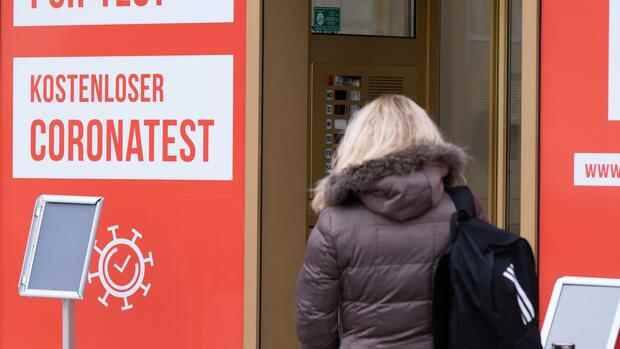Berlin After the video switch of the federal and state health ministers to combat corona, there were more questions than answers on Monday evening. With the looming chaos in the facility-related compulsory vaccination, a possible lack of PCR tests and the anger about the shortened convalescent status, the heads of department discussed a long agenda.
As a result, the federal and state governments now want, among other things, that the right to PCR tests remains for everyone. This was surprising, as the high-quality tests were originally intended to be used primarily in healthcare in the event that they became scarce. This is what the federal and state governments decided at their corona summit last week.
It is now said that PCR tests should be used primarily in these areas, but that everyone else can continue to be tested with them. The federal government must now develop a new test regulation – ideally this week, said Saxony-Anhalt’s Health Minister Petra Grimm-Benne (SPD) on Monday after the video switch. However, many questions still need to be clarified in detail.
For example, it is unclear how the laboratories can distinguish tests from people in the healthcare sector from those that do not fall under the prioritization. For this it would be necessary, for example, to also record the occupational group during testing – similar to how this was regulated at the beginning of the vaccination campaign with certificates from the employer.
Top jobs of the day
Find the best jobs now and
be notified by email.
It is also unclear whether and when a rapid antigen test will be sufficient in the future to detect an infection. It must be checked whether a confirmation PCR test can be dispensed with in the case of an available rapid antigen test without symptoms, according to the decision by the health ministers. “Instead, a follow-up test should be carried out with a second monitored antigen test from a different manufacturer.” In this case, it is unclear how sick people can prove their infection without a PCR test.
Control of facility-related compulsory vaccination unclear
This proof is important in order to obtain the convalescent status, for example. “Legal consequences, for example for proof of recovery or proof of quarantine, must be observed,” says the decision. The proof is also important because the laboratories report it to the health authorities, which in turn is included in the infection statistics of the Robert Koch Institute. If, in future, a rapid test will suffice to detect infection for certain groups, all rapid test centers may also have to be connected to the reporting channels.
On Monday, the health ministers could not agree on a return to the recovered status for six months. The department heads rejected a request from Bavaria to extend the convalescent status from the current three to six months. According to Grimm-Benne, Lauterbach had confirmed in the switch that the shortening of the recovered status was based on scientific results.
The health ministers did not advise on easing the corona measures on Monday, said Grimm-Benne. Opening prospects are firm intentions, but these can only be opened up after the peak of the omicron wave in mid-February.
There are still many unanswered questions about the facility-related vaccination requirement, which will apply from March 15th. The health authorities do not see themselves in a position to adequately control them.
State health ministers are pushing for a uniform nationwide approach
It is expected that on average five to ten percent of the employees will have no clear proof or no complete vaccination protection and a report will be sent to the health department, said Elke Bruns-Philipps from the Federal Association of Doctors in the Public Health Service, the “Rheinische Post”. “This is a significant burden with the examination of each individual case, as is now planned, which the health authorities cannot cope with in a timely manner.”
In a further resolution, the health ministers of the federal states are calling on the Federal Ministry of Health to coordinate “all open implementation issues” in the sense of a nationwide procedure. These included exceptions, the hearing of affected employees and the “type and period of validity of the sanctions and the question of uniform controls”. A “graded procedure” consisting of fines and a ban on activities is also necessary.
The law passed by the Bundestag and Bundesrat in December stipulates that employees in facilities with vulnerable people such as nursing homes and clinics must prove by March 15 that they have been vaccinated against Corona or have recovered from an infection – or submit a certificate that they are cannot be vaccinated. Employers must inform the health authorities if this does not happen. They then have to carefully examine each individual case.
More: Scholz clearly misses his vaccination target
With agency material
